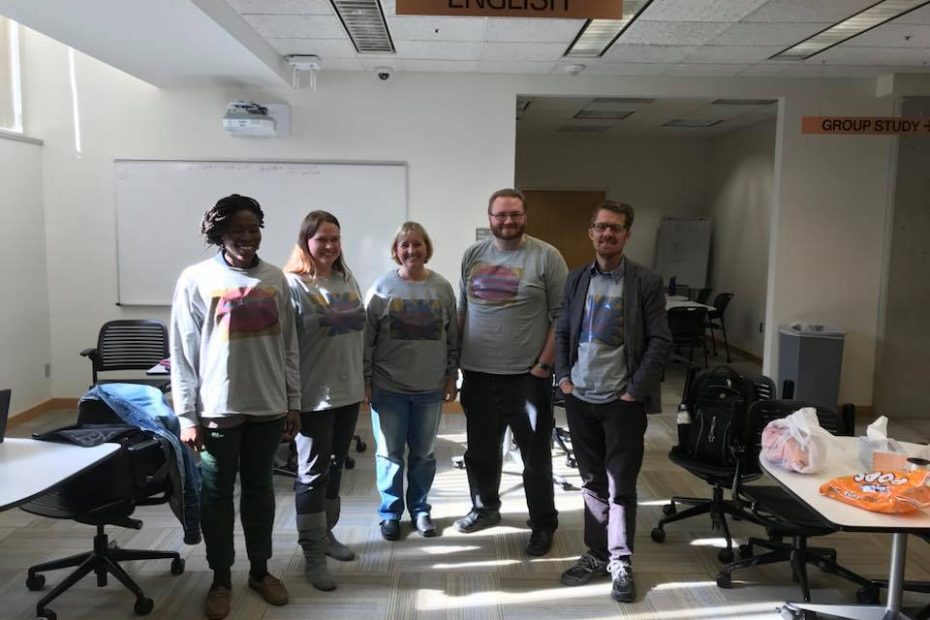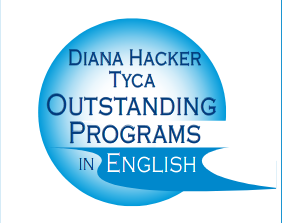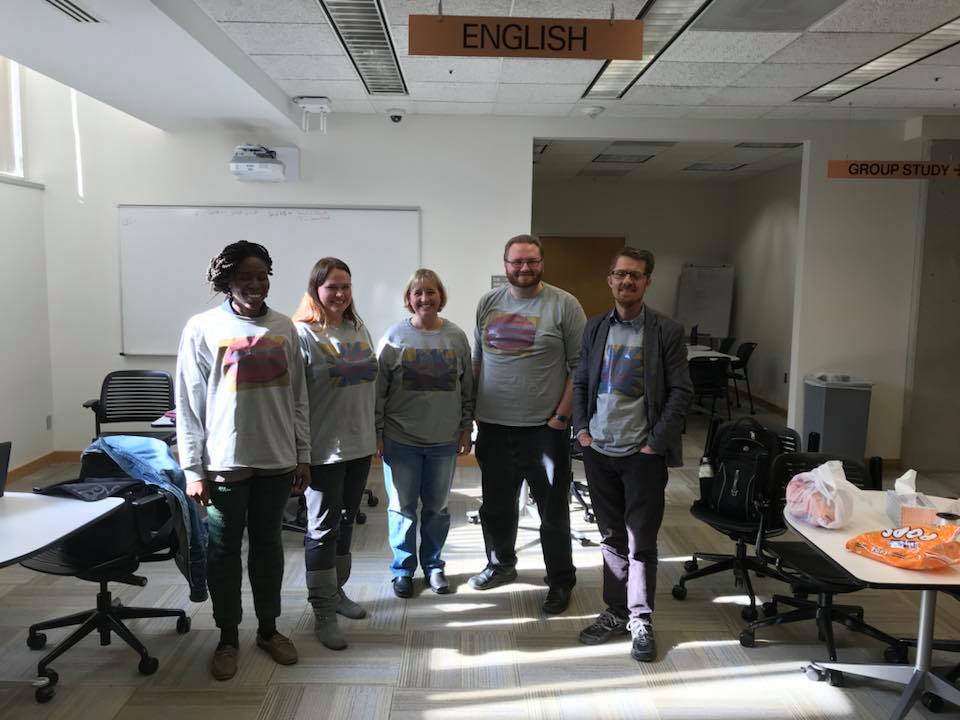As the years have piled on, I have been intentional about this role in the department. I haven’t always succeeded, but I do keep putting myself out there.
My most significant opportunity for mentoring and collaboration is through co-leading and working with the English 1010 O+ Team. Never in my teaching career have I been able to collaborate with fellow teachers in such a sustained and consistent manner.
This past year both Clint Johnson and Stacie Weatbrook moved onto other positions. Immensely difficult to see them go. They were an integral part of the O+ team for many years and it was a great loss to the program. But in those years we collaborated the hell out of stuff. We truly wrestled together with the task of teaching 100s of incoming freshman each semester, how to structure a curriculum, and how to do so in an innovative environment with partnerships with the library staff and an integrated Writing Fellows (WF) tutoring model. We worked as equals.
During the fall after Clint had moved onto Weber, he wrote to me, yes actually hand-wrote a letter in purple even, where he indicated, “I wouldn’t have this position at Weber if it weren’t for you (and Brittany as well). It’s been a tremendous blessing for my family. Life changing. And in large part I owe it to my maturation as a teacher, and a candidate, that you fostered by investing in me when you didn’t have to…I never felt it was about [merely] the job for you; it was about me.” Well, those few lines make it all worth it, I think. There’s something tangible and life-changing and sustaining. I do recognize that Clint overstates my impact and, of course, that he had a big impact on me (and all of us) as well. It wasn’t to help me get another position, but it was to help me stay engaged and to see teaching through the eyes of someone younger and less jaded than me. With Clint I had one of those rare opportunities where we understood each other personally and professionally and had many opportunities to collaborate. We created unit 1 for English 1010 O+ which was then used as a template for the department’s f2f course. And we wrote several OER pieces—the last of these, Story as Rhetorical, completed during this three-year cycle–on narrative at the same time; that is we breathed the same narrative theory air for more than year. I couldn’t and wouldn’t have done them without Clint’s feedback, conversation, and hope.
In addition, my working relationship with Stacie spanned even longer as she had asked me to be her mentor about a decade ago as part of school-wide adjunct program. While in O+ we did not work on as many specific projects together as I did with Clint, we talked teaching for several years in the lab. We overheard one another doing labs with easy and difficult students. We compared our approaches and we pushed each other to consider various ways to engage students. Many times we ran labs together with small groups of students and WFs. And often we would debrief tutoring sessions with one another and, again, with WFs. To teach in English 1010 O+ is to expose your own pedagogy and be exposed to the pedagogy of fellow teachers and tutors.
Another mentoring opportunity specifically comes through WF’s model which I take the lead on We generally hire new WFs each semester from the pool of successful and recommended students in O+. This allows for mentoring as these potential WFs work on specific Self-Directed learning activities in our tutor-track that expose them to composition theory and allow them to join in on lab sessions as observers. Once hired, WFs sit with us at the table literally and figuratively. Between appointments, we talk shop—responding to student writing, students in general, politics, and current events. It’s a great opportunity to have sustained engagement with these students. Again, I have been intentional with my engagement with WFs. If we are in the lab during the same time, I make time to check-in. If they don’t have appointments, I invite them to participate in my session. And I check in via email and, of course, field concerns that arise about particular students or, sometimes, writing fellows themselves. For example, I’ve worked closely with Erin Robbins the last few years and had many in-person and email exchanges with her. She is now moving on this summer to study in Writing and Rhetoric Students at the U. More formally, I coordinate the WF workshops on responding to writing and we ask WFs to sit in on some lab sessions each semester. In an interview I conducted, Erin makes clear the impact being a WF had on her academic career: “Being part of the Writing Fellows program has been one of the greatest opportunities of my life. That’s not hyperbole. I’ve never before felt like I might have a calling… I’ve never known a job to be so fulfilling.”
Some experiences are less positive but still require close collaboration and connections to various parts of the college. One semester a WF was demeaned by an SLCC athletic coach so I started a round of conversations and email threads with the SLCC athletic dept and with Jon Glenn, director of libraries. And on several occasions, there have been difficult encounters between WFs and students which have required interventions by me and other instructors. To be quite frank, and as will come as no surprise, I have no desire to play this type of administrative role, but I’ve stuck to it because I have a fierce belief WFs model, in students working alongside us.
As I was the lead writer on the original proposal for funds to secure the WFs model, I also wrote up a report, “Impact of the Writing Fellows Model in the English 1010 Online Plus Program” submitted to the Dean and Provost in 2019 to follow up on the use of those funds. While this request was limited in scope, I decided to take the opportunity to flesh out a comprehensive rationale and justification for the money spent on the WFs model based-off current research including from our own Clint Gardner, quantitative data captured by lab coordinators Jarrod Barben and Clint Gardener, and some qualitative data I was able to collect from WFs and O+ instructors.
Outside of the O+ program, I’m proud to have served on several colleagues’ committees in the last three years, two of whom completed tenure recently: Brandon and Benjamin. I served on their committee just about every year as they worked towards tenure. These opportunities allowed me to get to know their work as teachers and engage their scholarship.
And in 2019 Marlena asked me to give her feedback on her Distinguished Faculty Lecture, “Birthing Stories: Utah Women Writing.” The timing was good for me and I was able to give Marlena several close readings of her presentation. I think my feedback helped. In addition, it gave me an opportunity to get to know Marlena’s research interests and how they intersect with her own life and pregnancy. In retrospect, this was one of my first recent steps in thinking more carefully about what it means to be a female colleague in the department. The significance of giving birth, but also going through pregnancy and birth as one works fulltime. I was moved by the birth stories Marlena had collected and I was engaged with the reflection on narrative theory and rhetoric as applied to these stories. And it was gratifying to attend her distinguished faculty lecture to see her bring all of her hard work together.
On a college level, in the last two years, I’ve also twice been an instructor of the Online Teacher Credential class. It’s a good opportunity to share my experiences teaching online and give feedback on instructors learning to use Canvas and engage students online. On several occasions teaching this course led to more informal connections and discussions with adjunct faculty in our department about how to teach online. And I’ve given substantial feedback to the OTC team concerning the curriculum. My one main critique, ironically so, was that too many examples rely on English faculty and their online courses.






